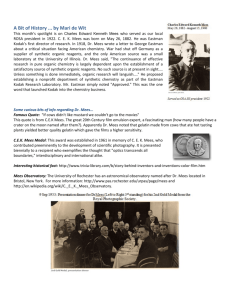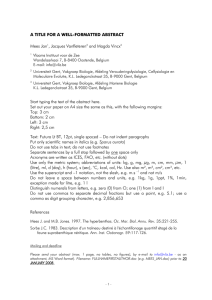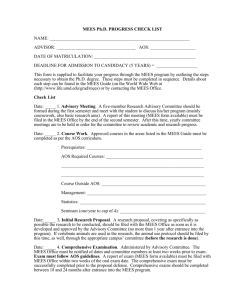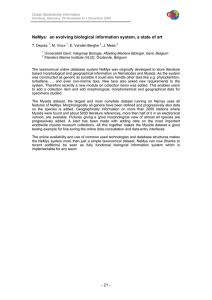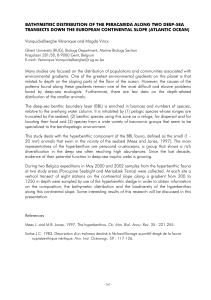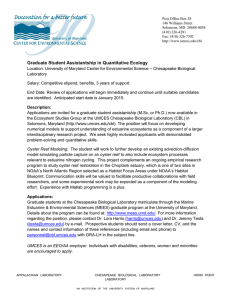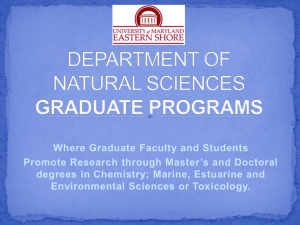MARYLAND U N I V E R S ...
advertisement
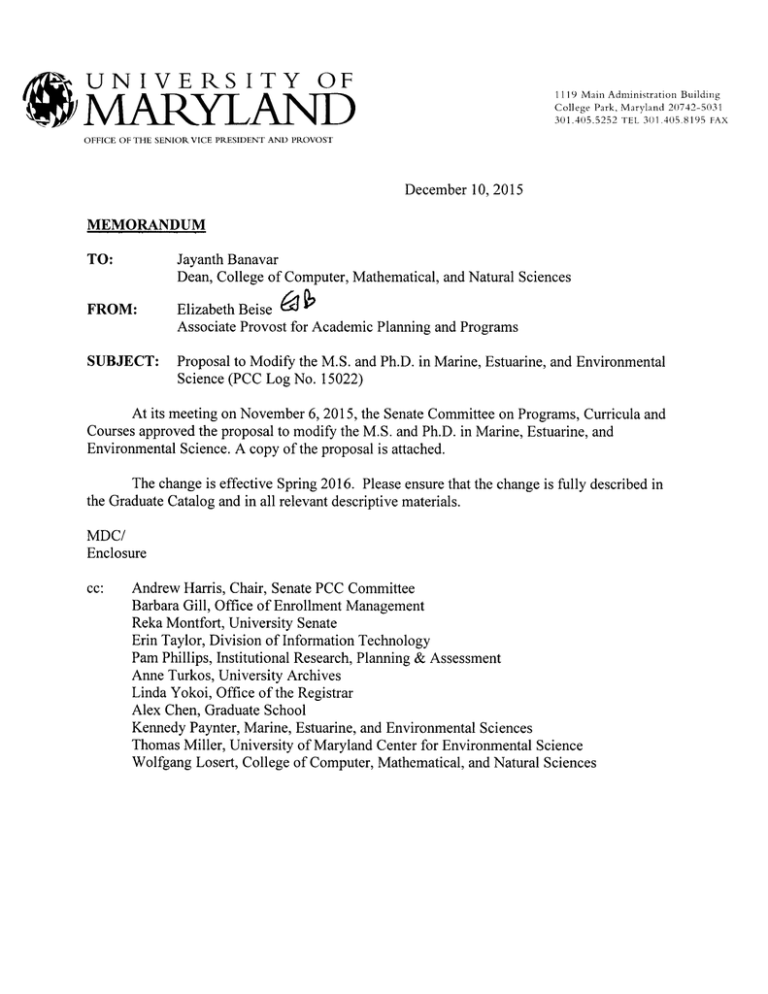
UN IV E RS I T Y OF 1119 M a i n A d m i n i s t r a t i o n B u i l d i n g College Park, M a r y l a n d 20742-5031 301.405.5252 T E L 301.405.8195 F A X MARYLAND OFFICE OF T H E SENIOR VICE PRESIDENT AND PROVOST December 10,2015 MEMORANDUM TO: Jayanth Banavar Dean, College of Computer, Mathematical, and Natural Sciences FROM: Elizabeth Beise Associate Provost for Academic Planning and Programs SUBJECT: Proposal to Modify the M.S. and Ph.D. in Marine, Estuarine, and Environmental Science (PCC Log No. 15022) At its meeting on November 6, 2015, the Senate Committee on Programs, Curricula and Courses approved the proposal to modify the M.S. and Ph.D. in Marine, Estuarine, and Environmental Science. A copy of the proposal is attached. The change is effective Spring 2016. Please ensure that the change is fully described in the Graduate Catalog and in all relevant descriptive materials. MDC/ Enclosure cc: Andrew Harris, Chair, Senate PCC Committee Barbara Gill, Office of Enrollment Management Reka Montfort, University Senate Erin Taylor, Division of Information Technology Pam Phillips, Institutional Research, Planning & Assessment Anne Turkos, University Archives Linda Yokoi, Office of the Registrar Alex Chen, Graduate School Kennedy Paynter, Marine, Estuarine, and Environmental Sciences Thomas Miller, University of Maryland Center for Environmental Science Wolfgang Losert, College of Computer, Mathematical, and Natural Sciences University of M a r y l a n d P C C P r o g r a m / C u r r i c u l u m / U n i t Proposal Program: Marine, Estuarine and Environmental Science Department/Unit: College/School' Computer, Mathematics and Natural Science Proposal Contact Person (with email): Thomas Miller, miller@umces.edu Type of Action (check one): [XjCurriculum change (includes modifying minors, concentrations/specializations and creating informal specializations) • Curriculum change is for an L E P Program I I I • I I I I Create an online version of an existing program I I Establish a new minor I I I I Establish a new Master or Certificate of Professional I Studies program other: • New Professional Studies program will be administered by Office of Extended Studies Approval Signatures This form uses digital signatures. When you are ready to move the proposal forward, please send via email to the appropriate person at the next the approval level. Approvers should click the appropriate signature field to sign. When approved by the dean of the college or school, please email this form and the proposal document as an MSWord attachment to pcc-submissions@umd.edu. Id 1. Department Committee Chair ThOITiaS MJIIer 2. Department Chair 3. College/School P C C Chair Wolfgang Losert 4. Dean 5. Dean of the Graduate School (if required 6. Chair, Senate P C C 7. Senior Vice President and Provost Summary of Proposed Action (use additional sheet if necessary): Unit Code(s) (to be entered by the Office of Academic Planning and Programs): 012030001303701 CMNS-Marine & Estuarine-Environmental Science Prog PROPOSAL FOR REVISION OF EXISTING PROGRAM MARINE, ESTUARINE AND ENVIRONMENTAL SCIENCE NEW AREA OF SPECIALIZATION STRUCTURE COLLEGE OF COMPUTER, MATHEMATICS AND NATURAL SCIENCES DEAN: JAYANTH BANAVAR PROPOSED INITIATION DATE: AUTUMN 2016 SEPTEMBER 10, 2015 EXECUTIVE SUMMARY The Marine, Estuarine and Environmental Science Program is a multi‐campus graduate program of the University of Maryland that is administered through the College of Computer, Mathematics and Natural Sciences. In 2013, a Curriculum Committee was empaneled by the Vice‐Chancellor for Academic Affairs to make recommendations for changes to the MEES Curriculum. The Curriculum Committee delivered its recommendations in February 2015 for broad changes to the structure of the MEES curriculum. This is a proposal to implement the recommended changes. MEES currently offers thesis‐based MS and PhD degrees at UMCP, UMBC and UMES. A new joint UMCP‐ UMCES degree certificate has recently been authorized. This proposal does not change or expand the degree offerings – MEES will continue to offer thesis‐based MS and PhD degrees. This proposal seeks describes changes in the organization and structure of the MEES curriculum, as recommended by the Curriculum Committee. Specifically, we propose to rationalize and realign the current six areas of specialization (Environmental Science, Ecology, Fisheries, Environmental Chemistry, Oceanography and Environmental Molecular Biology & Technology) into four foundational areas: Environment & Society, Earth and Ocean Systems, Ecological Systems, and Environmental Molecular Systems & Technologies. Each of these four areas will be supported by a new, single, required Foundation Course, and a range of electives, many of which already exist within the existing curriculum. Additionally, a new series of Professional Development courses are identified, including one new course – Applied Environmental Sciences – that will be required of all MEES students. Degree requirements remain unchanged in the new curriculum. I. OVERVIEW and RATIONALE A. Briefly describe the nature of the proposed program, explain why the institution should offer it. The Marine, Estuarine and Environmental Sciences (MEES) is an existing graduate program that operates at five institutions within the University System of Maryland (USM): University of Maryland Baltimore, University of Maryland Baltimore County; University of Maryland Center for Environmental Science, University of Maryland College Park, and University of Maryland Eastern Shore. The inter‐ institutional MEES program allows each partner institution to broaden the educational offerings for its students, increase enrollment in individual courses and reduce redundancy across USM institutions, leading to improved instructional effectiveness and more efficient use of resources. Simply stated, the inter‐institutional MEES program provides educational opportunities to students that may not available on their own campuses, thereby strengthening the educational programs at each institution. MEES increases collaboration across and within USM institutions. This provides students access to a breadth of teachers, advisors and committee members not available on their own campuses. Additionally, MEES has promoted and expanded access to research facilities and instrumentation for its students on campuses across the MEES partnership. Taken together, the inter‐disciplinary and collaborative nature of MEES leverages the reputations of each partner institution to generate a higher visibility presence in environmental science than any of the campuses could achieve by themselves. The MEES program is headquartered at UMCP and administered through the College of Computer, Mathematics and Natural Sciences (CMNS). The program is led by a Director, who currently holds a joint UMCP – UMCES appointment and one full time administrator. Additionally, the MEES Administrative Council, which comprises the Provosts and Graduate Deans from each participating institution and is chaired by the Senior Vice‐Chancellor for Academic Affairs, exercises oversight over the program. The program offers thesis‐based MS and Ph.D. degrees. The curriculum, last revised in 1993, consists currently of six areas of specialization. Student numbers have been declining over the last decade, but the program currently recruits about 40 new students annually. This translates to about 6‐7 students per area – numbers that are insufficient to support a vital and effective educational program based on its current structure. The MEES program was subjected to an external review in 2008. The review panel recommended improving the MEES curriculum to move the program from “good to great” by leveraging the broad expertise in environmental sciences within USM. In response to the external review, the MEES Administrative Council was established and endorsed the need for an evaluation of the MEES curriculum. Accordingly, the MEES Administrative Council empaneled a MEES Curriculum Committee in December 2013 to evaluate and revise the MEES curriculum in response to the observations of the external review. Charge from the MEES Administrative Council to the MEES Curriculum Committee Working from a strong base of the multi‐campus MEES program, the Curriculum Committee will create a structure and curriculum that would establish and sustain MEES as the premier environmental graduate program in the country. This will be accomplished by including appropriate areas of focus, providing pathways to a variety of degrees and outcomes, and aspiring to recruit sufficiently large number of qualified students. Educational Landscape The new MEES curriculum was developed to reflect the change in the education landscape since the current MEES curriculum was established. There are three important drivers of change recognized by the curriculum committee: the definition and scope of the environmental sciences are changing; the need for scientific knowledge to shape policy for existing and emerging environmental challenges by integrating our understanding of human and natural systems is increasing; and also the national need to train students in STEM fields to supply the future workforce is increasing. The MEES Curriculum Committee addressed these three core challenges in the new curriculum. In its challenge to the nation, the NRC committee on “New Biology for the 21st Century” suggests that biological sciences are in the midst of a revolution. The revolution is breaking down traditional barriers between biological disciplines – in some cases re‐integrating fields that were historically unified but that had then developed into apparently independent disciplines. Reading the NRC Committee report, it is clear that their definition of biological sciences matches very well with the diversity and breadth of the marine, estuarine and environmental sciences as currently embodied in the MEES program. Indeed, the committee’s first three challenges of understanding adaption to changing environments, sustaining ecosystem function and expanding sustainable alternatives to fossil fuels are all areas of current research by faculty within the MEES program and certainly fit within the MEES umbrella. The NRC committee’s 2009 recommendations encourage interdisciplinary interactions solely within the life sciences. But, the environmental sciences are more than the sum of all the life sciences. For example, to understand the impacts of an emergent contaminant on an estuarine fish, it is not possible to focus just on how the contaminant is absorbed, metabolized and excreted within the fish’s body; rather we must understand the chemical and physical processes that affect its distribution and concentration and the transformations it may undergo that could render it more or less toxic in the environment. Environmental science must include a broad range of the natural sciences. Thus to re‐ align the NRC recommendations for MEES we must promote trans‐disciplinary interactions across all of the natural sciences. The MEES Curriculum Committee believes that the fundamental strength of the MEES program is that it was established to and continues to break down barriers between disciplines and to promote inter‐ and transdisciplinary research. The MEES Curriculum Committee believes that it is critically important that a new curriculum should promote opportunities for students to obtain inter‐and transdisciplinary training and that this is best achieved in an inter‐institutional graduate program that leverages the full breadth of expertise within the University System of Maryland. As the planet’s population increases toward 8 billion people, the world is facing a series of daunting challenges including global climate change, food and water security and threats to biodiversity. Indeed many current MEES students and faculty were motivated to become environmental scientists in the first place because of a passionate desire to understand how the world works in the hopes of contributing to solving some of these problems. But conducting high quality science is, by itself, insufficient to address these challenges. We must provide opportunities to learn how both to conduct and communicate our science in a way that increases the chance that it will alter individual behaviors, inform government policy or alter commercial investments. This requires changes in not only how we design, carryout and analyze our science, but also to how we engage with and communicate to the broader society. The MEES Curriculum Committee believes that training a generation of scientists who focus on conducting science that can inform policy debates, that can lead to social change and that can be translated into technologies, to help meet current and future environmental challenges should be a hallmark of the MEES program. But a focus on translational science within environmental sciences is insufficient. Many of the pressing environmental challenges will not be addressed purely by work on the natural systems. Rather, many pressing environmental challenges require understanding of both the natural and human system to which it is coupled. In many ways efforts to understand the interactions between human and natural systems is merely a further expansion of our recognition of the need to encourage a holistic transdisciplinary approach. MEES has traditionally been a natural science program. We do not suggest that MEES abandon this focus, and there are some students and faculty who will continue to work exclusively within this sphere. But, we believe it is critical that the MEES program expand its constituency to include the social sciences as they pertain to understanding environmental issues if we are to train the young environmental scientists we need in the future. The MEES Curriculum Committee believes that a new MEES curriculum should explicitly include training in relevant social sciences. Further, we believe that social science training should be integrated within the curriculum rather than being viewed as an accessory to it. This will require that we reach out to colleagues across the USM who have not traditionally collaborated with the MEES program. It is widely recognized that the nation faces a critical shortage of workers to fill the growing demand for jobs in STEM fields. The federal government suggests that employment opportunities in all fields will expand by 14% from 2010‐2020 – but that opportunities for medical scientists and biomedical engineers are expected to expand by 30‐60%. Clearly the nation needs a future generation of U.S. trained workers who are equipped to understand the scientific principles in STEM fields. Two aspects of STEM are particularly relevant to MEES and have been core strengths of the program since its inception. First, a signature of MEES has been a strong foundation of quantitative training – including both statistical and analytical approaches. The need for this training will only rise with increases in the volume of data that can now be collected, accessed and analyzed. The problem of “big data” is sufficiently well recognized that the Big Data Research and Development Initiative was announced in 2012. This initiative seeks to advance core technologies to store, curate, manage and analyze vast volumes of data. Additionally the initiative seeks to train the future work force to operate in “big data” environments. The initiative highlights efforts by the National Science Foundation to develop interdisciplinary graduate programs to prepare the next generation of scientists and engineers, with a particular focus on training in “big data” issues. The MEES Curriculum Committee believes that the MEES program should respond directly to these objectives by continuing to provide strong quantitative training within an interdisciplinary MEES program. The emphasis on STEM education also implies a focus within MEES on technological solutions to environmental sustainability. Such a focus could include biotechnological solutions to drug discovery or energy alternatives and more traditional environmental science fields that support spatial planning on land and in the oceans. The MEES Curriculum Committee believes that MEES should seek to expand its coverage of technological approaches by leveraging existing expertise and seeking partnerships with other programs within USM as appropriate. Integrating across the three features of the changing educational landscape (interdisciplinarity, applied science, and STEM training), the MEES Curriculum Committee suggests that MEES should go beyond traditional research‐based degrees to encompass a full spectrum of non‐ thesis Master’s degree options and continuing job training through graduate certificate programs. Such diversification will promote effective training for students with a range of career aspirations beyond academia to include government, NGOs and commercial interests. B. How big is the program expected to be? From what other programs serving current students, or from what new populations of potential students, onsite or offsite, are you expecting to draw MEES currently has 186 students across all five partner institutions. One hundred thirty two (132) MEES students are matriculated through UMCP. However, we note that 85 of these students work principally with UMCES faculty and will be eligible for a joint UMCP‐UMCES degree. Of the total UMCP MEES student number, 51 are enrolled in the MS program and 81 are enrolled in the Ph.D. program. The students are not evenly distributed over current six AOSs (Fig. 1). The total number of applicants to MEES has declined from about 215 per year in the period 2002‐2006 to 165 per year over the last five years. Approximately 30% of students who apply to MEES are accepted, and 70% of students who are accepted subsequently enroll. The decline in student numbers is attributable to both the increase in competitive programs and the age of the current MEES curriculum. 1. Based on the Curriculum Committee’s review of the educational landscape and the principles established to guide curriculum development within MEES, the MEES Curriculum Committee established the following aspirations to provide signposts of progress toward implementation of the new curriculum. MEES will be a nationally preeminent graduate program in the environmental sciences that takes full advantage of the diverse faculty and resources of the University System of Maryland. 2. Students training in the MEES program will be known for their expertise in generating, assessing and implementing science that leads to new fundamental discovery, synthesis of existing knowledge and the application of that science for the benefit of society. M.S. students Ph.D. students CHEM 12% OCEAN 16% ECOL 21% FISH 25% ENVSC 24% ENMB 2% OCEAN 34% CHEM 6% ECOL 16% ENMB 10% FISH 12% ENVSC 22% Figure 1. Percentage of UMCES students enrolled in the MEES program by degree sought and Area of Specialization (AOS) from 2002 to 2014 OCEAN=Oceanography; CHEM=Environmental Chemistry; ECOL=Ecology; ENMB=Environmental Molecular Biology and Biotechnology; ENVSC=Environmental Science; FISH=Fisheries Science. 3. The MEES program should expand to accept up to 80 research‐based degree candidates annually. We believe that the distribution of students among the five partner institutions will not change substantially – thus our aspirational goal is for the enrollment of 50‐60 students annually within MEES at UMCP and UMCES II. CURRICULUM A. Provide a full catalog description of the proposed program, including educational objectives and any areas of concentration. The university‐wide Graduate Program in Marine‐Estuarine‐Environmental Sciences (MEES) trains qualified graduate students, working toward the M.S. or Ph.D. degree, who have research interests in fields of study that involve interactions between biological, physical and chemical systems in the marine, estuarine, freshwater or terrestrial environments. The program comprises four foundation areas: Environment & Society, Earth & Ocean Systems, Ecological Systems, and Environmental Molecular Systems & Technology. Students work with their Advisory Committee to develop a customized course of study based on research interests and previous experience. B. List the courses (number, title, semester credit hours) that would constitute the requirements and other components of the proposed program. Provide a catalog description for any courses that will be newly developed or substantially modified for the program. Requirements for the MEES Graduate Program. MEES offers thesis‐based MS and Ph.D. degrees. Independent research theses and dissertations are the hallmark of both degrees, respectively. Student research is supported by an innovative curriculum that is structured around 4 interdisciplinary foundations (Figure 2): Environment & Society, Earth & Ocean Sciences, Ecological Systems, and Molecular Ecology and Environmental Biotechnology (Appendices A‐ D). These interdisciplinary areas guide student progress to degree completion, but do not overly restrict students as to the courses they may take. The interdisciplinary foundation areas are meant to provide a structure to ensure suitable pre‐requisites are taken for later courses. The four foundation courses are inherently inter and even trans‐disciplinary. However, while broad inter‐disciplinary knowledge is essential for tackling the world's complex environmental problems, deep and detailed disciplinary knowledge is equally important. In fact, the balance and interplay between depth and breadth of understanding, to which the new curriculum aspires, will be needed to solve these complex problems. The MEES curriculum is designed specifically to emphasize a unique educational balance of disciplinary strength and inter‐disciplinary perspective that will insure the continued success of future MEES graduates following graduation. Figure 22. Proposed new MEES curriculum. Existing courses are shown in normal font, new courses in underlined font. The Curriculum is separated into 4 interdisciplinary areas which guide student progress. All incoming students will be required to take “Applied Environmental Sciences” and an interdisciplinary Foundation Course. Two additional professional development courses are required of all students, but they need not be taken prior to taking elective courses. Individual courses may fulfill multiple electives The new curriculum requires the immediate offering of 8 new courses (Appendices A‐H). Only one of these courses will involve UMCP faculty – MEES 6XX Environment & Society Foundation (Appendix A). This course will be taught be faculty from Anthropology (UMCP) and by faculty from UMCES. All other new courses will be taught by UMCES and UMES faculty and impose no cost on UMCP. New Courses Full syllabi of the proposed new courses are provided as attachments. Here we provide the overall course summary that would appear in the graduate catalog. MEES 6XX. Environment & Society. (3 Credits). Students will obtain foundational knowledge of core theories and practice methods in the following research domains of integrated social and environmental concerns: Coupled natural and human systems, Cultural models of the environment, Political ecology and governance, Ecological economics and Environmental ethics. Students will develop scholarship and practice in the human dimension aspects of ecological systems that includes critical thinking, written and verbal communication, and practice in interdisciplinary fieldwork to hone skills in data collection, goal facilitation, consensus building, and network analysis. Full curriculum is provided as Appendix A. MEES 6XX Earth & Ocean Systems. (3 Credits). Students will gain a fundamental understanding of the physical and biogeochemical dynamics of the earth‐estuarine‐ocean system. Students will gain process‐based knowledge of the earth‐estuarine‐ocean system from theoretical, experimental, and empirical vantage points. Students will be expected to demonstrate both qualitative and quantitative understanding of fundamental physical and biogeochemical processes, and their interactions, synthesize and apply information from multiple scientific disciplines (e.g., hydrology, biogeochemistry, physical oceanography) and formulate testable hypotheses through integration of theory and observational data. Full curriculum is provided as Appendix B. MEES 6XX Ecological Systems. (3 Credits). Students will gain literacy in central theories and avenues of research in ecological systems, including the principles of production, natural selection and life history, population ecology, communities and ecosystems and land‐ and seascapes. Students will apply demonstrate mastery of the principal theories and ideas relating to ecological systems and the ability to express ideas relating to ecological systems in quantitative terms Ability to synthesize ideas across systems and scales. Full curriculum is provided as Appendix C. MEES 6XX Environmental Molecular Systems & Technology. (3 Credits). Students will gain literacy and understanding of molecular biological processes, methods and approaches related to environmental systems including DNA, RNA and protein synthesis, genomics and comparative and environmental genomics. Students will learn how molecular techniques have revolutionized ecology, conservation, and taxonomy, allowed the understanding of microbial communities and provided the opportunity to investigate the characteristics of plant and animal populations in non‐ invasive ways. Full curriculum is provided as Appendix D. MEES 6XX Applied Environmental Sciences – A Case Study Approach. (3 Credits). Students will be exposed to the range and diversity of environmental problems that are the focus of study within MEES through studying case studies of environmental challenges currently facing society. Students will gain knowledge of how scientific knowledge is applied to provide solutions to environmental problems. Full curriculum is provided as Appendix E. MEES 6XX Environmental Statistics I. (3 Credits). Students will obtain the quantitative training for students in the environmental sciences. It will explore the basic practices of statistics to inter‐ disciplinary environmental data. The goal is to train students with the statistical knowledge and tools needed to conduct statistical analysis in their own research. The statistical programming language R is used in class, to complete homework sets, and to analyze online data. Full curriculum is provided as Appendix F. MEES 6XX Environmental Statistics II. (3 Credits). Students will obtain advanced quantitative training in environmental statistics. Students will consider the analysis of auto correlated data (spatial and temporal), the development of functions within R and the production of reports. The statistical programming language R is used in class, to complete homework sets, and to analyze online data. Full curriculum is provided as Appendix G. MEES 5XX R Programming. (2 Credits). This course will engage students in programming in the world's most popular language for statistical computing — R. Nowadays, R is used in governmental organizations, in academia, and in industry (i.e., everywhere) for everything from financial forecasting to studying new drug efficiency to evaluating the impacts of global warming. Students will learn R language with examples by practicing them in class. The course will start from foundations — installing R and getting data into it — and will continue with blocks on data manipulation, visualization, writing functions, etc. The course focuses on a programming rather than providing statistical interpretation. Full curriculum is provided as Appendix H. Requirements for the M.S. degree in MEES A. Required coursework. Students in the M.S. program will work with an advisory committee to tailor and design a program of study appropriate to their interests. The program of study requires an independent research project and course work that must include a minimum of 30 credits with 24 credits of course work and 6 credits of graduate research. Of the 24 course credits, 12 of them must be at the 600 level or higher. Each approved plan of study must include the following four elements a. Foundation Course (3 Credits): Students must take one of the four foundation courses (MEES 6XX Environment & Society, MEES 6XX Earth & Ocean Systems, MEES 6XX Ecological Systems or MEES 6XX Environmental Molecular Systems & Technology). b. Professional Development Courses (6 Credits). Students must take MEES 6XX Applied Environmental Sciences – A Case Study Approach. Students must take one additional Professional Development Courses c. Elective Courses: Students are free to select from a range of existing MEES courses, bearing in mind the stated Foundation Course pre‐requisites. Professional Development courses may qualify as elective courses. d. Issue Study Group Seminars (up to 2 credits). Students must enroll in at least one interdisciplinary, topical seminar B. Required Thesis. Each student will undertake an independent research project under the guidance of a MEES faculty member. C. Thesis Defense: An Oral Defense of the Thesis, administered according to Graduate School regulations, will take place at the completion of the research project. This defense will be conducted by the Advisory Committee and will be administered once all other degree requirements have been fulfilled. Requirements for the Ph.D. degree in MEES A. Required coursework. Students in the Ph.D. program will work with an advisory committee to tailor and design a program of study appropriate to their interests. The program of study requires an independent research project and course work that must include a minimum of 36 credits with 24 credits of course work and 12 credits of graduate research. Of the 24 course credits, 12 of them must be at the 600 level or higher. Each approved plan of study must include the following four elements a. Foundation Course (3 Credits): Students must take one of the four foundation courses (MEES 6XX Environment & Society, MEES 6XX Earth & Ocean Systems, MEES 6XX Ecological Systems or MEES 6XX Environmental Molecular Systems & Technology). b. Professional Development Courses (6 Credits). Students must take MEES 6XX Applied Environmental Sciences – A Case Study Approach. Students must take one additional Professional Development Courses c. Elective Courses: Students are free to select from a range of existing MEES courses, bearing in mind the stated Foundation Course pre‐requisites. Professional Development courses may qualify as elective courses. d. Issue Study Group Seminars (up to 2 credits). Students must enroll in at least one interdisciplinary, topical seminar e. Comprehensive Exam. By the end of their second year students should take a comprehensive exam, administered by the advisory committee that assesses whether students have the background required to complete dissertation research. B. Required Dissertation. Each student will undertake an independent research project under the guidance of a MEES faculty member. a. Advancement to Candidacy. By the end of their third year students should submit a research proposal to their committee and undergo an oral examination of their proposed research. The final proposal must be approved by the advisory committee C. Dissertation Defense: An Oral Defense of the Thesis, administered according to Graduate School regulations, will take place at the completion of the research project. This defense will be conducted by the Advisory Committee and will be administered once all other degree requirements have been fulfilled. C. Describe any selective admissions policy or special criteria for students selecting this field of study. We will maintain the existing admission criteria for MEES. Specifically, applications for admission in the fall semester must be filed by February 1; if financial assistance is needed, it is better to apply by December 1. Students may also be admitted for the semester starting in January, for which the deadline is September 1, with July 1 as the preferred deadline for assistance and June 1 as the international applicant deadline. Applicants must submit an official application to the University of Maryland, along with official transcripts of all previous collegiate work, statement of interests and experiences, resume, three letters of recommendation, and scores on the General Test (aptitude) of the Graduate Record Examinations. It is particularly important that a student articulate clearly, in the application, a statement of goals and objectives for future work in the field. Because of the interdisciplinary and interdepartmental nature of the program, only students for whom a specific advisor is identified in advance can be admitted. Prior communication with the faculty in your choice area of specialization is highly encouraged. III. STUDENT LEARNING OUTCOMES AND ASSESSMENT Many of the existing student learning outcomes and approaches to assessment that are currently employed in MEES will be continued. At the broadest level, MEES program students will utilize an interdisciplinary approach involving critical thinking and scientific discovery to understand and solve environmental problems. To achieve this goal, students in MEES program will receive training in (i) the fundamentals of environmental sciences, (ii) state‐of‐the‐art tools used in environmental science, and (iii) application of environmental science and technologies as they pertain to important societal problems. Meeting these objectives will meet the national need for a STEM trained future workforce, provide a diversity of career paths for our students beyond academia, promote diversity of background and aspirations within the student body, and broaden the student base. Learning Outcomes for MEES graduate students Students completing a MEES graduate degree: 1. will independently read and synthesize pertinent information from the body of published scientific literature 2. will independently plan, design and conduct original research following scientific protocols 3. will collect, analyze and interpret data from an original research project 4. will effectively and independently write original research findings for a scientific audience of a quality suitable for publication in an appropriate scientific journal 5. will orally communicate a technical summary of their original research effort to a scientific audience Outcomes Assessment Schedule A sequence of events are included as regular components of the normal graduate student program and provide opportunity for outcome assessment. The approximate timing at which these events occur differ between the MS and Ph.D. degree. For MS Students Assessment of satisfactory completion of required and elective courses. Report of annual meeting of the student with her/his advisory committee (Appendix I). MS Thesis defense – at the end of the MS program. For Ph.D. Students Assessment of satisfactory completion of required and elective courses. Report of annual meeting of the student with her/his advisory committee (Appendix I). Ph.D. Comprehensive Exam – by the end of the second year (Appendix J). Ph.D. Proposal Defense – by the end of year three. Ph.D. Dissertation – at the end of the Ph.D. program (Appendix K). IV. FACULTY AND ORGANIZATION A. WHO WILL PROVIDE ACADEMIC DIRECTION AND OVERSIGHT? MEES is a single interdisciplinary, multi‐campus graduate program in environmental sciences supported by participating institutions within the University System of Maryland. The MEES Administrative Council, which comprises the Provosts and Graduate Deans from each participating institution and is chaired by the Senior Vice‐Chancellor for Academic Affairs, exercises oversight over the program. Participation by faculty at partner institutions is broad (http://www.mees.umd.edu/campus‐umcp). B. IF THE PROGRAM IS NOT TO BE HOUSED WITHIN A SINGLE ACADEMIC UNIT, PROVIDE DETAILS OF ITS ADMINISTRATIVE STRUCTURE. The MEES program is headquartered at UMCP and administered through the CMNS. The program is led by a Director, who currently holds a joint UMCP – UMCES appointment and one full time administrator. The Director of the MEES program reports directly to the Dean of the CMNS and to the MEES Administrative Council. The MEES administration is overseen by a Program Committee. The Program Committee is a vehicle for shared governance and represents academic areas in the curriculum and the partner institutions. The Program Committee will have responsibility for administrative oversight of the curriculum, identification of elective courses that need to be developed, and approval of course content. The Program Committee is chaired by the MEES Director and include two representatives of each foundation area, and one representative of each institution. This committee will be responsible for evaluating and approving all proposed courses prior to submission to the appropriate institutional Program and Curriculum Committee. MEES Program Committee responsibilities will also include the establishment of administrative and academic policies specific to the MEES program, making various recommendations to the Director, approval of faculty appointments and various other governance duties. V. OFF CAMPUS PROGRAMS None VI. OTHER ISSUES A. Describe and cooperative arrangements with other institutions or organizations that will be important for the success of this program. The core of the MEES program is the strong relationship between UMCP and UMCES. This mutually‐ beneficial relationship has been developed since the founding of MEES in 1978. Today that relationship is supported at the highest levels on each campus as signified by the Memorandum of Understanding between UMCP and UMCES regarding MEES that was signed by President’s Loh and Boesch on June 4, 2012. This MOU commits both institutions to the long term future of MEES. Faculty participation within MEES is supported by their home academic units. For example, on the UMCP campus, faculty involvement is regulated by and credited to their home unit. On the UMCES campus, faculty involvement is regulated by and credited to the research laboratory at which their tenure or appointment resides. Educational planning at UMCES is overseen by the UMCES Vice‐ President for Education. Faculty on all MEES campuses were involved in developing the new curriculum which will be submitted to the MEES Administrative Council for approval at its Fall 2016 meeting. Subsequent to approval by the MEES Administrative Council, each institution will move to implement the new curriculum on their campus. VII. COMMITMENT TO DIVERSITY A. Identify specific actions and strategies that will be utilized to recruit and retain a diverse student body. The MEES Program is committed to diversity. The current student body is 63.4% female and non‐white students comprise 26.6% (of students who identified race) of the student body. The University of Maryland Eastern Shore, an Historically Black Colleges and Universities (HBCU), is an active partner in MEES. However, MEES is committed to increasing minority representation in the program. We work with the Maryland Sea Grant College to identify and recruit non‐traditional students in their REU program VII REQUIRED PHYSICAL RESOURCES A. Additional library and other information resources required to support the program. None B. Additional facilities, facility modification, and equipment that will be required. No new equipment or facilities are required. However, the interdisciplinary, multi‐campus nature of MEES is strengthened when MEES courses and disciplinary areas are available to all students at all participating campuses. Therefore MEES is committed to being a leader in the delivery of high quality courses to students via integrated high‐quality video technology, emerging communication technologies, and flexible class scheduling and siting. C. Impact, if any, on the use of existing facilities and equipment None IX. RESOURCE NEEDS AND SOURCES A. List new courses to be taught, and needed additional sections of existing courses The new courses are detailed in Appendices A‐H B. List new faculty, staff and teaching assistants None C. How will teaching, advising and administrative duties be covered No new teaching, advising or administrative duties are required. D. Identify the source to pay for the required physical resources E. List and other required resources None F. Provide the information requested in Table 1: Resources and Table 2: Expenditures. THE UNIVERSITY LIBRARIES Daniel C. Mack Associate Dean, Collection Strategies and Services 4119 McKeldin Library College Park, Maryland 20742 301.405.9264 dmack@umd.edu Elizabeth Beise, Ph.D. Associate Provost, Academic Planning and Programs University of Maryland 1124 Main Administration Building College Park, MD 20742 Thomas Miller, Ph.D. Director and Professor, Chesapeake Biological Laboratory University of Maryland 146 Williams Street, P.O. Box 38 Solomons, MD 20688 10 October 2015 Dear Dr. Beise and Dr. Miller: The University of Maryland Libraries provide this assessment in response to the proposal to changes in the organization and structure of the Marine, Estuarine and Environmental Science Program (MEES). MEES enrolls students from the University of Maryland College Park (UMCP), the University of Maryland Baltimore (UMB), the University of Maryland Baltimore County (UMBC), the University of Maryland Center for Environmental Science (UMCES), and the Institute for Marine Environmental Technology (IMET), which is a partnership of UMCES, UMBC and UMB. A majority of faculty are currently drawn from UMCES, with a potential to increase participation by UMCP faculty in the future. The library collections at each of the participating institutions currently support MEES’s curriculum and research enterprise. Existing library resources, including subscribed and licensed journals, research database, print and electronic books, and other content are sufficient to support MEES’s students and faculty. The proposed changes will not alter the program’s information needs. Therefore, since the library at each participating institution has adequate resources, licensing of library content will not be an obstacle for implantation of the propose programmatic changes. In the future MEES may identify new journals or other information resources that would enhance its program. MEES administrators should be aware that each institution’s library would need to identify funds to subscribe to future resources to ensure that they are available to all program participants. The participating libraries could investigate a joint license, which could possibly introduce some cost savings. In conclusion, since current library resources at all participating campuses support MEES, and since the proposed changes do not alter the program’s information needs, licensed library content does not propose any hindrance to the proposed changes. Please let me know if you have any questions or require additional information. Sincerely, Daniel C. Mack Associate Dean, Collection Strategies and Services Re:ANTHsupportforcurriculumchange 1of1 ile:///Z:/ACAF/Programs+Planning/PCC15‐16/CMNS/MEES/ANT... Subject: Re: ANTH support for curriculum change From: Thomas Miller <miller@umces.edu> Date: 9/24/2015 2:32 PM To: "Paul A. Shackel" <pshackel@umd.edu> CC: "miller@umces.edu" <miller@umces.edu>, Elizabeth Jane Beise <beise@umd.edu>, "Kennedy T. Paynter Jr" <paynter@umd.edu>, "Michael J. Paolisso" <mpaoliss@umd.edu> Paul, Many thanks for the very suppor ve le er Many thanks Tom On the road. Excuse brevity On Sep 24, 2015, at 9:37 AM, Paul A. Shackel <pshackel@umd.edu> wrote: Dear Professor Miller: I am wri ng to express support for the proposed revisions to the curriculum for the Marine, Estuarine, and Environmental Science program (MEES). Our Anthropology Department has a strong focus on the human dimensions of the environment, one of our three areas of concentra on at the graduate level and also a focus of a number of our undergraduate classes. For more than a decade, this interest has resulted in a number of interac ons with the MEES program. Our faculty have taught MEES students over the years, and some of our faculty are affiliates to the MEES program. Our graduate students interested in environmental issues have also taken MEES courses. And finally, our faculty have collaborated with MEES faculty on interdisciplinary research. These interac ons have been very produc ve and beneficial to our research and teaching goals. However, these interac ons have been on a case by case basis, and lacked any systema c and consistent engagement. The proposed curriculum revisions to the MEES program represent a significant improvement in the ability of our department to engage with and support the mission of both our department and the MEES program. Par cularly significant in these revisions is the crea on of a founda onal area and courses focused on Environment and Society. The social and environmental sciences fully recognize the need for collabora on and integra on (e.g., the Socio‐Environmental Synthesis Center (Sesync). The addi on of an environment and society focus to the MEES curriculum, at the level of founda onal area, is a mely and innova ve change that will help build sustained ins tu onal collabora ons between social science departments like Anthropology and the environmental sciences. I look forward to greater interac ons between faculty and students in Anthropology and the MEES program. The proposed curriculum changes will help facilitate new and produc ve collabora ons. Sincerely yours, Paul A. Shackel Professor and Chair Department of Anthropology 1111 Woods Hall 4302 Chapel Lane University of Maryland College Park, MD 20742 301‐405‐1425 pshackel@umd.edu 10/20/201511:37AM Re:MEESCurriculumproposal 1of2 ile:///Z:/ACAF/Programs+Planning/PCC15‐16/CMNS/MEES/BIOL... Subject: Re: MEES Curriculum proposal From: Thomas Miller <miller@umces.edu> Date: 9/12/2015 10:19 AM To: Bill Fagan <bfagan@umd.edu>, Elizabeth Jane Beise <beise@umd.edu>, "Kennedy T. Paynter Jr" <paynter@umd.edu> CC: "Amanda C. Grimes" <agrimes@umd.edu> Many thanks Bill for the speedy reply Cheers, Tom On 9/12/2015 10:17 AM, Bill Fagan wrote: Dr. Thomas Miller Professor and Director Chesapeake Biological Laboratory University of Maryland Center for Environmental Science Dear Tom Thank you for contacting me regarding your efforts to revise the MEES curriculum. As chair of the Biology Department, I wanted to express my enthusiasm and support for the proposed changes. As we discussed, I see this program as complementary with the BISI‐BEES (Behavior, Ecology, Evolution, and Systematics) graduate program, and believe there are many opportunities for synergies to develop. In particular, I am enthusiastic about your plans to make all of the MEES graduate courses available to remote participants, either through online offerings or through the IVN system. This will create interesting new opportunities for graduate students advised by Biology faculty. In closing, I support your new curriculum and wish you a speedy approval. Bill Fagan Professor and Chair Department of Biology University of Maryland College Park, MD 20742 Phone: (301) 405‐6884 FAX: (301) 314‐9358 Email: bfagan@umd.edu Research Innovation Scholar National Socio‐Environmental Synthesis Center (SESYNC) 1 Park Place, Suite 300 Annapolis, MD 24101 Phone: (410) 919‐4810 Websites: http://www.clfs.umd.edu/biology/faganlab/ http://www.sesync.org/ ________________________________________ ‐‐ Thomas Miller Professor and Director Chesapeake Biological Laboratory University of Maryland Center for Environmental Science P. O. Box 38 146 Williams Street Solomons, MD 20688 Tel: (410) 326‐7276 Fax: (410) 326‐7264 WWW:hjort.cbl.umces.edu 10/20/201511:38AM Re:MEESCurriculumproposal 1of2 ile:///Z:/ACAF/Programs+Planning/PCC15‐16/CMNS/MEES/SPH... Subject: Re: MEES Curriculum proposal From: Thomas Miller <miller@umces.edu> Date: 9/29/2015 3:56 PM To: "Stephen M. Roth" <sroth1@umd.edu> CC: "Donald K. Milton" <dmilton@umd.edu>, Elizabeth Jane Beise <beise@umd.edu>, "Kennedy T. Paynter Jr" <paynter@umd.edu> Many thanks Steve. Cheers, Tom On 9/28/2015 3:42 PM, Stephen M. Roth wrote: Dear Tom, After review and discussion of the proposed MEES PhD curriculum change, the faculty within the Maryland Institute for Applied Environmental Health support the proposal and think this will be of benefit to current and future MEES doctoral students. If you need additional information, please don¹t hesitate to contact me. Best, Steve ______________________ Stephen M. Roth, Ph.D. Professor & Interim Director Maryland Institute for Applied Environmental Health School of Public Health University of Maryland College Park, MD 20742 301‐405‐2504; fax 301‐405‐8397 http://www.sph.umd.edu/miaeh ‐‐‐‐‐Original Message‐‐‐‐‐ From: Thomas Miller [mailto:miller@umces.edu] Sent: Friday, September 11, 2015 2:04 PM To: Don Milton <" dmilton"@umd.edu>; Elizabeth Jane Beise <beise@umd.edu>; Kennedy T. Paynter Jr <paynter@umd.edu> Subject: MEES Curriculum proposal Don, Thank you for taking the time to talk with me earlier in the summer to discuss the MEES curriculum. I benefited greatly from understanding how MEES interfaces with the programs offered in MIEH. We have now progressed to the point where we are submitting a formal proposal to the College of Computer, Mathematics and Natural Science's PCC committee to have the new curriculum adopted. A shortened version of the proposal is attached ‐ it remains unchanged from what we discussed. When we chatted I mentioned that it would be very helpful if you could provide a letter of support for the new curriculum. I would greatly appreciate it if you could send an email to me that indicates that MIEH is supportive of the new curriculum copied to both Associate Provost for Academic Planning Betsy Biese and MEES Program Director Ken Payner (both copied on this email), by September 28th. 10/20/201511:39AM Department of Atmospheric and Oceanic Science Computer and Space Sciences Building University of Maryland College Park, Maryland 20742-2425 USA Tel: (301)405-5365 Fax: (301)314-9482 carton@atmos.umd.edu http://www.atmos.umd.edu/~carton October 7, 2015 Dr. Thomas Miller Director, Chesapeake Biological Laboratory and Professor 146 Williams Street, P.O. Box 38 Solomons, MD 20688 Dear Tom: I have shared your ‘Proposal for revision of the existing program MEES new area of specialization’ with the AOSC faculty. They found it to be complementary, and not at all in conflict, with our AOSC program. Their only comment was to encourage us to take advantage of the new changes to develop courses of interest to both MEES and AOSC. Best wishes, James A. Carton 1
